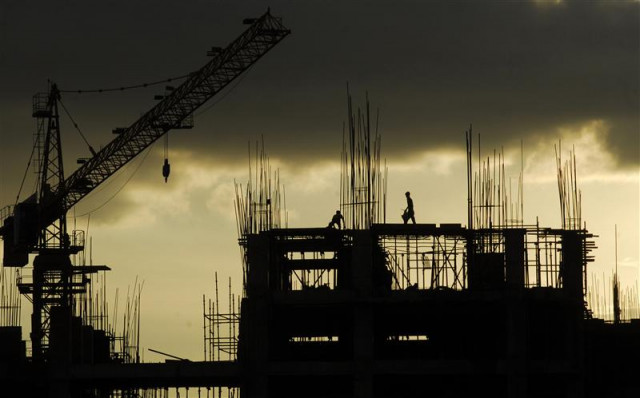Govt moves to boost real estate, but stakeholders remain unimpressed
Some officials believe this will bring slight improvement; others are not so optimistic

PHOTO: REUTERS
However, stakeholders are unsure about the extent of the decision's positive impact on the market.
In an apparent move to inject new life in the property market before the general elections, the federal government slashed on Thursday property valuation rates by up to 57% for certain localities of Karachi, Lahore, Islamabad, Rawalpindi, Peshawar and Faisalabad.
Former finance minister Ishaq Dar had unveiled a three-year programme in August 2016 in consultation with realty sector stakeholders for an upward revision in property valuations to bring them in line with the market.
However, now, instead of increasing the rates for collection of federal withholding and capital gains tax, property valuations have been pushed down for certain localities of six major cities.
"This will definitely improve market sentiments though, this is not enough," Association of Builders and Developers (ABAD) Chairman Arif Jeewa told The Express Tribune.
Builders, developers and real estate dealers believe the downward-revised FBR valuations were a huge blow to the sector that may take time before the sector can stand on its feet again. The stakeholders want the government to reduce the percentage of 12% taxes (including 3% federal and about 9% provincial levies).
"We want the government to gradually reduce the combined 12% taxes to help improve investor sentiment," he added.
Pakistan's property market has provided extraordinary returns since the PML-N took office in mid-2013. A relatively safer environment along with bullish sentiment on the economy helped revive investor interest that was hit due to security-related issues.
However, since the introduction of new property valuations for 16 major cities of the country in August 2016 to collect withholding and capital gains tax, the market has shown dismal growth.
Perturbed with the slowdown in the property market, it seems that the government wanted to provide some sort of incentive to investors.
Owing to gaps in tax laws and different property tax rates, real estate players declare two types of property prices - one for paying provincial taxes and the other for federal taxes. However, both of these prices are far lower than the prevailing market rates.
Such a difference has led to the parking of over Rs7 trillion in the real estate market over the years. In June 2016, the government attempted to bridge the gap, but ended up offering a tax amnesty scheme.
People legalised over Rs290 billion worth of black money in just three months of the current fiscal year in return for paying a paltry Rs877 million in taxes under the amnesty scheme.
"I do not think the reduction in property valuations will make any positive difference on the market," Pakistan Real Estate Investment Forum (PREIF) President Shaban Elahi told The Express Tribune.
We believe the government could have helped legalised more than Rs1,000 billion and earn more than Rs3 billion in taxes under the amnesty scheme, he added.
"The government needs to help people declare their undeclared money. By doing so, the government could earn much more taxes once it comes into the system," Elahi said when pressed about the paltry sum of Rs877 million that the government earned on declared amount of Rs290 billion.
On Thursday, the FBR issued six separate notifications, which will not only affect federal tax collection, but will also encourage further accumulation of black money.
Published in The Express Tribune, January 13th, 2018.
Like Business on Facebook, follow @TribuneBiz on Twitter to stay informed and join in the conversation.



















COMMENTS
Comments are moderated and generally will be posted if they are on-topic and not abusive.
For more information, please see our Comments FAQ